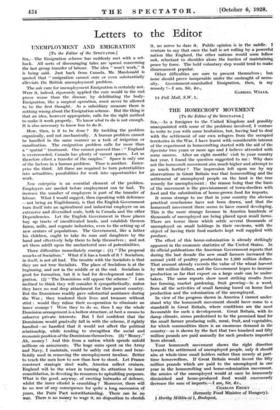Letters to the Editor
UNEMPLOYMENT AND EMIGRATION [To the Editor of the SPECTATOR.]
SIR,—The Emigration scheme has suddenly met with a set- back. All sorts of discouraging tales are spread concerning the last group transfer of labour. The idea " won't work," it is being said. Just back from Canada, Mr. Macdonald is quoted that " emigration cannot cure .or even substantially alleviate the British unemployment problem.
The sole cure for unemployment Emigration is certainly not. Were it, indeed, rigorously applied the cure would in the end prove worse than the disease, by debilitating the body. Emigration, like a surgical operation, must never be allowed to be the first thought. As a subsidiary measure there is nothing wrong about the Emigration scheme.' But the thing is that an idea, however appropriate, calls for the right method to make it work properly. To know what to do is not enough. It is also necessary to know how to do it.
How, then, is it to be done ? By tackling the problem organically, and not mechanically. A human problem cannot be handled in the same manner as a task of irrigation or canalization. The emigration problem calls for more than a " spatial " treatment. One cannot proceed thus : " England is overcrowded, Canada has plenty of vacant spaces. Let us therefore effect a transfer of the surplus." Space is only one of the factors in a human problem. Time is another. Enter- prise the third. All three are required to turn potentialities into actualities, possibilities for work into opportunities for work.
_New enterprise is an essential element of the problem.
Employers are needed before employment can be had. To increase the number of employers is part of the transfer of labour. What I would suggest, then (speaking with deference —not being an Englishman), is that the English Government turn itself into an agricultural and industrial employer on an extensive and diversified scale, both in Canada and the other Dependencies. Let the English Government in those places buy up tracts of uncultivated lands, and establish thereon farms, mills, and cognate industries, even to the setting up of new centres of populations. The Government, like a father his children, ought to take its sons and daughters by the hand and effectively help them to help themselves ; and not set them adrift upon the unchartered seas of potentialities.
Three difficulties immediately emerge : (1) " The proposal
smacks of Socialism." What if it has a touch of it ? Socialism, in itself, is not all bad. The trouble with the Socialists is that they are not true Socialists. The place of Socialism is at the beginning, and not in the middle or at the end. Socialism is good for formation, but it is bad for development and inte- gration. (2) " The Dominions will oppose the scheme." I am inclined to think they will consider it sympathetically, unless they have no real deep attachment for their parent country. But the Dominions readily gave substantial assistance during the War ; they tendered their lives and treasure without stint : would they refuse their_ co-operation to eliminate an inner scourge ? Were they to do so, then I say the whole Dominion arrangement is a hollow structure, at best a means to subserve private interests. But .I feel confident that the Dominions would gradeally fall in with the scheme, if rightly handled—so handled that it would not affect the political relationship, while •tending to strengthen the social and economic position of the Dominions themselves. (8) " Money." Ah, money I Arid this from a nation which spends untold millions on armaments. The huge sums spent on the Army and Navy, I maintain, could be safely cut doirn and bene- ficially used in removing the unemployment incubus. Better to teach the men how to sow than how to shoot. Let France Construct strategic steel walls, America collect cruisers. England will be the wiser in turning its attention to inner consolidation, in devoting its resources to upbuilding purposes. What is the good, anyway, of 'erecting bulwarks of defence, whilst the inner citadel is crumbling ? Moreover, there will be no war Of 'any consequence for quite a. long succession of years, the Paris-Pact 'notwithstanding. There can be no war. There is no money to wage it, no disposition to cherish
it, no nerve to dare it. Public opinion is in the saddle. I venture to say that once the ball is set rolling by a powerful nation like England, the other nations would soon follow suit, reluctant to shoulder alone the burden of maintaining peace by force. The bold voluntary step would tend to make disarmament popular.
Other difficulties are sure to present themselves ; but none should prove insuperable under the onslaught of neces- sity. Government-marshalled Emigration, then, is my
remedy I—I am, Sir, &c., _ .
14 Pall Mall, S.W.1.
GABIUEL WELLS.






















































 Previous page
Previous page